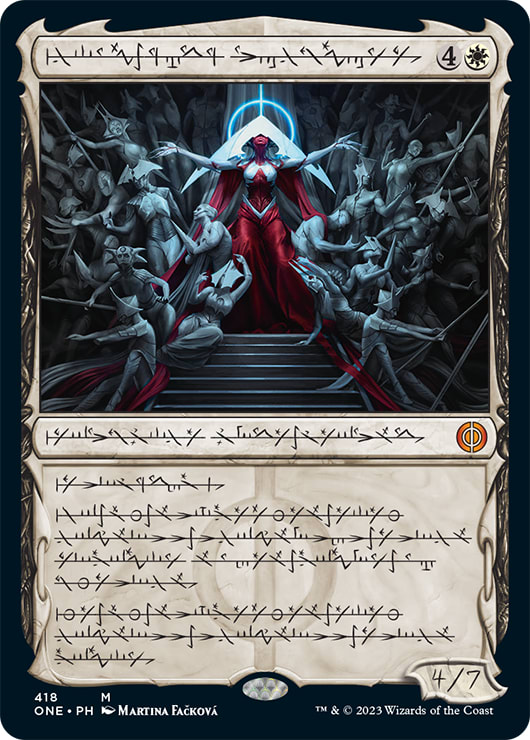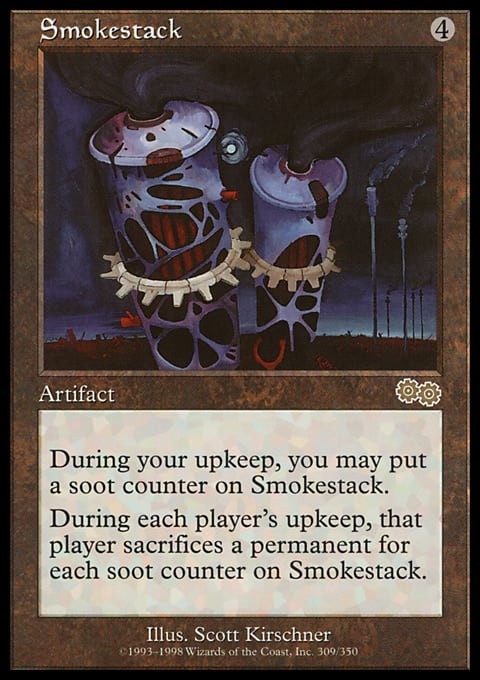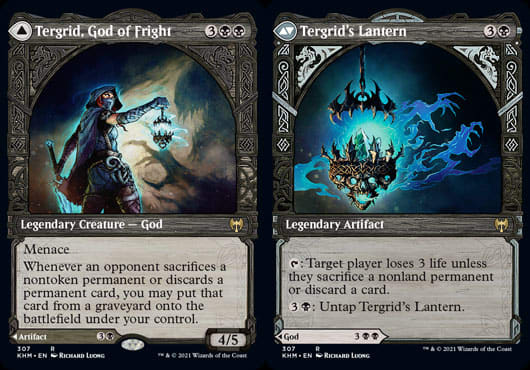
You sit down at a table to play some casual Commander. It isn't a tournament or a league and you have a quick pre-game conversation in which you establish that nobody is playing a deck that should regularly win the game before turn six or seven. You shuffle up and start to play.
By the time you hit the mid game, you can't cast your commander, as a Drannith Magistrate is on the field preventing you from casting cards from anywhere other than your hand. The Wood Elves in your hand is a dead card thanks to an Elesh Norn, Mother of Machines in play that prevents any enter the battlefield effects from triggering for three out of the four players at the table. Even if you wanted to cast that Wood Elves, it would cost you 1 mana more, thanks to an opponent's commander - Grand Arbiter Augustin IV - and you're starting to wonder what happened to the fun, casual game of commander that you thought you were getting into.
What's happening is that you may have just run into a "stax" deck.
Stax is a deck archetype in Commander that focuses on slowing the game to a crawl, denying opponents the ability to play their decks, and buying yourself enough time to eventually "break parity" or dig to your own wincon.
Breaking parity means playing out cards with symmetrical effects that actually hurt your opponents more than they hurt you. This can be done in a number of ways and will vary depending upon your deck and the card in question.
Drannith Magistrate will lock everyone out of playing their commanders and will hurt some decks much more than others. If a player has a low-cost commander and can get their general on the battlefield before anyone else, they'll be in a great place to play Drannith Magistrate and keep anyone else from following suit. If a player's deck is just not built around their commander, but everyone else is playing a deck that is highly dependent upon having their commander on the field, they'll be free to play Drannith whenever they like because they don't mind having their commander unavailable to them.
A card like the new Elesh Norn, Mother of Machines is an example of a card that provides an asymmetrical effect. Most stax decks play a mix of symmetrical and asymmetrical cards and will attempt to break parity on the symmetrical effects so that they are able to move their game plan forwards while everyone else is struggling to get anywhere. Preventing your opponents from gaining any benefit from cards that trigger upon entering the battlefield is an extremely powerful ability. Doubling your own "ETB" triggers may or may not be good for your deck, depending on whether you tried to build around "Elesh Mom".
The third example I shared above, Grand Arbiter Augustin IV, will tax your opponents for casting spells and will reduce the cost of your own spells. A player on Grand Arbiter will be slowing everyone else down and speeding themselves up without having to do anything other than play their commander!
$t4ks
Before we dive any deeper into this topic, it's worth looking at where the term came from.
I used to think Stax was just a reference to Smokestack, which is an artifact that gets Soot counters and forces players to sacrifice permanents on their upkeep.
I've also read that the term came from a Vintage deck which was called "The Four Thousand Dollar Solution". This was a "prison" deck that had a real-world average price tag around four thousand dollars. Prison decks are designed to "lock" other players up so they cannot play the game, or at the very least they are very limited in what they can play effectively.
I actually haven't been able to find a definitive answer as to where Stax came from, but it's a part of Commander and at some point you'll probably have to deal with it - especially if you play in a public meta against new players and a variety of decks. Eventually it will come up.
If that's an unsatisfying answer as to where Stax came from, maybe I can better explain why people play it.
A Day At the Races
While I might enjoy dropping a reference to the zany hijinks of the Marx Brothers, a game of Commander with a Stax deck rarely feels like a day at the races.
In Magic there tends to be a race to build faster and faster decks, ideally without sacrificing interaction and resiliency. If your deck can consistently win before turn three, you should be able to reliably beat decks that can only consistently attempt to win before turn five. That might not seem like a wide gap, but in competitive Magic an awful lot can happen in two turns.
Casual players are usually more concerned with having games that go long enough that their deck can do what they built the deck to do. You might have some short games but there is a general understanding that lower powered EDH is not a place where you're aiming to slam a wincon as early as possible so nobody else has a chance.
Just for a moment, imagine that EDH decks are like race cars.
In casual play, you will see a mix of street-legal cars, Demolition Derby cars, Nascar race cards, IndyCar race cards, Drag Racers and even the occasional bumper car or clown car. You'll see nearly everything over time because lots of casual players enjoy variety and like to push the limits of our format in nearly every direction.
In competitive play you'll see less clown cars and bumper cars, and the race is often over before slower entrants have even gotten up to full speed. You'll find players interested in winning at all levels of play, but they are generally drawn to higher powered EDH.
The solution for some of these players isn't to get a faster car or a car that requires fewer pit stops and can stay on the track longer.
What if you could win the race by making sure the track was two and half feet deep in mud and you were the only one driving a tractor?
You might think that's crazy, but that's basically what Stax is doing.
They are trying to gum up the game plan of everyone else, and they want to be uniquely positioned to be able to get ahead and stay ahead.
Sometimes the Nascar, Indycar, and Drag Racers will just look at their spinning wheels, look at the tractor slowly moving ahead of them, and throw in the towel. Sometimes they will stubbornly refuse to concede and the game will take hours to reach its conclusion. Sometimes they even manage to find a way to get traction and combo off or otherwise find a way to reach the finish line first.
It's messy, and it can take a long time, but is it any fun?
Don't Yuck My Yum
Before I dig into what "fun" is, and how everyone really does have a different opinion of what they find fun about playing Commander, it's worth noting the difference between casual and competitive Commander. This discrepancy can apply to lower power levels but is really more applicable to High Powered and cEDH levels of play.
The Competitive mindset, as I understand it, is that anything goes and you are all trying to win the game. That means you can slam a turn two win and folks shouldn't get salty. You shuffle up and play again, and if your deck isn't fast enough to keep up the onus is on you to tune your deck up so you can compete.
Stax is fine in cEDH, and in my opinion it's also OK in high powered Commander. If you want to be able to play nearly anything, you have to let the Stax player do their thing as well. If you can't find a way to beat them, you need to adjust your deck and your gameplan so that you can deal with the unique challenges and headaches they are presenting.
The Casual mindset is that you're trying to balance winning with having fun. You might play wincons, removal, interaction, fast mana, "hatebears" and even stax pieces, but you are also trying to have a game where everyone has fun. That can be a challenge at times, and when there is a mismatch in play styles, people can get salty, but the ultimate goal isn't just to win at all costs. Playgroup health and player happiness is about balancing deck power levels and game experiences so that everyone has a good time.
Whether or not Stax has any place in casual Commander is an interesting question. I often like to suggest that over the course of an evening of play, everyone at the table should get to play what they want. That "hot take" comes with a caveat - you get to play your deck, but you also have an obligation to the table to not always be playing something that everyone else hates playing against.
That means that if I want to play my own "guilty pleasure" deck - Narset, Enlightened Master (extra turns), I owe it to the table to not play that deck all night long if they really don't enjoy playing against it. The same holds true for any other acquired taste, including Stax. If one of your friends wants to play their Grand Arbiter Stax deck, I don't think it's right to tell them they don't get to play it just because you don't enjoy the experience. It isn't just about you and your experience, and you should do your best to suck it up and let them play that deck.
What Stax is Not
If you sit down for a game of commander and your opponent is playing Baral, Chief of Compliance. They counter your commander and make it clear that nobody is going to resolve any spell worth worrying about without their permission.
That might not feel good, and it might not be fun, but it's not Stax. That's control.
You sit down to play a game of commander and someone plays a Tocatli Honor Guard. That "hatebear" shuts down creatures with enter-the-battlefield triggers.
That's just a hatebear. You may or may not be playing against a Stax deck. If you load up a deck with enough cards that shut down players' ability to play the game, you're probably playing a Stax deck, but I don't know that there is a bright line where on one side you're Stax and on the other you're not.
I'd urge you to not overreact to Stax and to not use the term as a slur. Stax is just another way to play the game, and its adherents often say that they're just trying to get everyone to play "fair" magic.
If a few well-placed counterspells and a hatebear have you flipping tables and whining that you didn't think you were going to be playing against a Stax deck, you might want to reconsider your choice of hobbies. Sometimes you're going to encounter some resistance when you play your deck and sometimes that resistance will be more than your deck can deal with. Lots of us like to play more casual games where we let our tablemates do what they want to do, but it's perfectly within the rules and even within the spirit of the game to interact and to try to slow each other down sometimes.
A good Stax player, like a good cEDH player, will be honest about their deck. Have a pre-game conversation. If you're just not in the mood to play against heavy control or Stax, by all means ask for a more casual, easy-going game.
To Play or Not to Play
Does all this mean the Stax player gets to drag your group's first game out for hours and "ruin" the evening for the entire playgroup?
First off, that question is terrible.
I'm assuming you hate Stax and that your disdain for Stax and having a long, drawn-out slog of a game is shared by everyone else at your table.
Maybe some of the players enjoy the challenge of trying to out-slog the slog master on their Stax deck?
Maybe if you change your mindset you might also enjoy the unique challenge that a Stax deck presents.
Let's assume that is impossible and you are going to hate the experience no matter what. Stax isn't your thing and whether you're playing at a high level or you're playing more a casual flavor of EDH, you don't want to deal with having all those extra hurdles put in the way of playing your deck.
Do you have a right to your time? Do you have the right to tell them they can't play their deck?
I think this is a really interesting question. I know people who will outright refuse to even play against a Tergrid, God of Fright deck. They feel that their time is more valuable and they'd rather do nearly anything else than sit there watching a tablemate force them to discard and sacrifice permanents only to see their cards put onto the Tergrid player's battlefield.
Is it better to refuse the game than to agree to the game and then be miserable?
What if you shuffled up and started the game, but conceded at the first sign that things were starting to get out of hand and become a miserable, unpleasant game? Do you owe the Tergrid player or the Stax player the right to make you miserable for an hour of your life?
I think ultimately it comes down to a personal choice and an understanding of how well you can deal with that kind of experience.
If you can't be a good, pleasant tablemate when playing against a certain type of deck, don't even agree to the game. Sure, it sucks for the player with their shiny new Stax deck, but Commander is meant to be a shared experience. That includes the way everyone comports themselves at the table. If you'll resent the lost hour(s) of your life and the unpleasant experience so much that you can't be a good tablemate, don't even play.
Final Thoughts
I personally don't blame anyone for not playing against Stax. I don't like to play cards that make it harder for my tablemates to play the game. I'm more drawn to the Nascar style of Commander than either Drag Racers or Tractor Pulls. I like longer games, but I also like games where you get to do stuff.
I'd be perfectly happy if I never again played at a table where any spell a player cast was automatically countered (for any reason) or destroyed (by any effect). I'm looking at both of you, Jin-Gitaxias, Progress Tyrant and Elesh Norn, Grand Cenobite.
While I may not be into cards that shut down my opponents, I have also known the sweet bliss of that moment when you find a way to thread your way through a maze of stax pieces and manage to hit your wincon even though a turn before it seemed impossible. There is a genuine delight in those times you're able to solve that Stax puzzle and come out on top.
If you're into Stax and defend the archetype as a way of forcing players to "play fair Magic" I hope I've managed to both explain why people play it and shape players' expectations around what they're going to experience if they shuffle up against you.
There are lots of online resources where you can learn more about this fascinating archetype of Magic, and if I've piqued your interest please tread carefully. Don't play a good Stax deck against casual players who aren't ready for, aren't interested in it, and might just get turned away from the format as a result. It's a great challenge, but also an acquired taste and should probably only be played at lower power levels with the agreement of everyone involved.
That's all I've got for today. Thanks for reading and I'll see you next week!



























